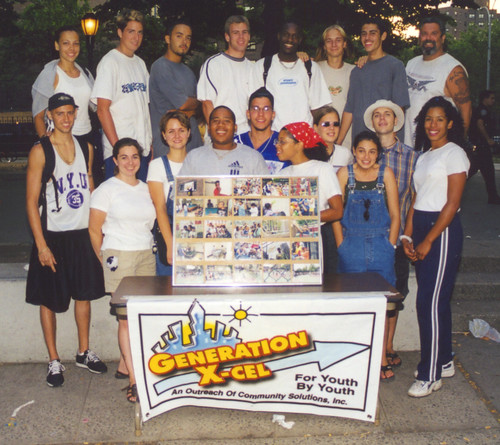
Many of the Generation Xcel co-founders with the Summer 1999 interns
“And a child shall lead them.” – Isaiah 11:6
“You see things and say, ‘Why?’ But I dream things that never were and say, ‘Why not?’” George Bernard Shaw
It felt like a mutiny.
As an official youth group, we were still young, not yet two years old, and our teens were even younger spiritually. Most were new to the congregation and raw street kids without any prior church association.
For a while, everything seemed to fall together seamlessly. They had embraced faith and each other, and our growing community of 25-30 teenagers was tight. But for many the romance was waning, the infatuation phase ending, and teens were once again being teens. Insecurities resurfaced, identities were challenged, but mostly, it seemed, they complained about being “bored.”
What about the boredom?
As the 21-year-old leader of the pack, I felt overwhelmed and unqualified to navigate the choppy waters. We tried everything to keep them engaged, from field trips and outings to chill time and sports. During a citywide scavenger hunt, I even introduced one girl to her deepest crush, Leonardo DiCaprio, at Toys-R-Us. Our meetings were interactive, with games and role-playing and discussions and debates, and even wrestling when none of the other adults were around. We did stuff together, both formally as a group and informally as friends. We hung out, shopped and ate together, played pool and video games, and watched T.V.
Still, they claimed boredom. Worse, they manifested disinterest, indifference, and frustration, and that frustration was starting to boil over. Bored kids get themselves in trouble, and trouble was starting to seep back into the group.
The pressure was rising, not so much from the storefront congregation, but from within. My confidence was shaken, and I was starting to feel like a failure. Building a group that didn’t yet exist was easy by comparison. But now, a year and a half after construction began, cracks in the workmanship were starting to show.
Time to be vulnerable
Then Builder Bob intervened. Bob from the church is one of the most honest men you’ll ever meet, passionate about the Lord, compassionate for people, and real about his shortcomings. That realness made him safe to talk to, so I vented one evening. He listened. Empathized. Did all the things a friend does in a crisis. But then he challenged me.
“Scrap the agenda,” he said (more or less; I didn’t record the conversation). “At the next meeting, don’t preach. Be real. Sit in a circle. Tell the kids what you’re feeling. Ask them to do the same. Find out what’s really going on. Are you committed to each other? The community? What’s the point?”
At the risk of stating the obvious, he promised this could be hazardous. Putting yourself out there is a vulnerable place to be. And inviting open-ended conversation, even criticism, might backfire. But leadership isn’t about playing it safe. Sometimes, it requires courage, and he encouraged me to find some.
So I did. Since my agenda wasn’t working anyway, I ditched it at the next meeting, situated the chairs in a circle, told the group what I was feeling, and asked them to do the same. What surfaced surprised me. The youth felt bored not because they wanted to pull away, but because they wanted more.
Why not?
Many of them were already coming to church every time the doors were open, for youth group services, Sunday worship, midweek Bible studies and prayer meetings. But even if they came to every service and lingered afterwards for fellowship and volunteered in between, at most we kept them busy for 12-15 hours a week. They still had nowhere to go after school, much less during long, hot summers. The streets were unsafe; home was contentious; schools lacked extra-curricular offerings. Why couldn’t they have a space of their own, where they could stay out of trouble and bring their friends? If the church really wanted to engage the community, why couldn’t we meet a community need and create our own youth center?
“Uh,” I thought, “How about this for starters? No money. No staff. No equipment. No space. No qualifications. No experience. No expertise. A disgruntled group of teenagers and a failed youth leader.”
By God’s grace, I didn’t actually list the reasons that evening, instead saying something like: “Why not? David was too young and inexperienced to fight Goliath. Esther was too unlikely to save her people from genocide. Mary was too virginal to give birth to anyone, never mind God’s son. Who’s to say we can’t start a youth center? But if it’s going to happen, we’re going to have to do it together, as a group. No one’s going to give it to us. We’re going to have to lead.”
I’m looking forward to part 2. This article was impactful as it reminds me of critical leadership characteristics ( courage and seeking help ) and relationships building ( being honest and vulnerable about how you really feel) and lastly but most important making a vision into a reality against all opposition. Thanks for this message Gods been dealing with me on the issue of bravery/ courage and seeking help/pride. This pushes me more into a righteous direction –
Hi Vegas, I’m glad to hear the article was helpful to you. Check out Part 2 right here.
I am happy that I read this article and part 2. Thank you for the inspiration on our venture here in Macon GA.
[…] [Continued from Part 1] […]
[…] 2010 here) and blogs (see, for example, “Embrace the Mess: Why Youth Must Lead Now” Part 1 and Part […]